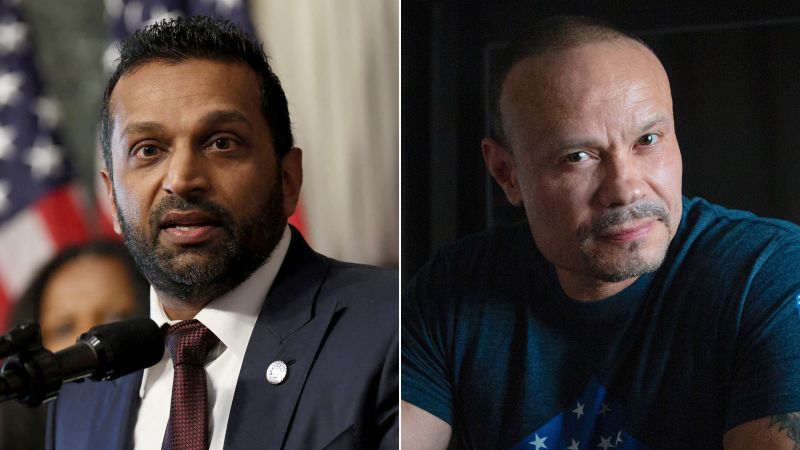In 2023, Dan Bongino, a widely recognized podcaster, raised eyebrows with his provocative statement questioning the circumstances surrounding the death of Jeffrey Epstein. “What the hell are they hiding with Jeffrey Epstein?” he demanded publicly. This inquiry encapsulated the ongoing public fascination and numerous speculations that have persisted since Epstein’s highly publicized demise in 2019. Fast forward to 2025, and Bongino found himself in a position that would elicit disappointment from his past self; as the FBI’s deputy director, he declared emphatically, “I have reviewed the case. Jeffrey Epstein killed himself,” via a post on X, formerly known as Twitter.
Bongino’s assertion garnered a significant backlash, reflecting a widespread skepticism that has grown over time. Many of his followers expressed disbelief, leading to an intense wave of responses that underscored a larger societal issue. This pushback is indicative of the current political landscape where loyalty to former President Trump often supersedes allegiance to factual information emanating from established institutions like the FBI. The phenomenon signals a fracture in trust among Trump’s supporters regarding those once hailed as champions of the MAGA agenda.
Conspiracy theories have woven themselves into the fabric of the MAGA movement since Trump’s ascent in political circles. The rhetoric from right-wing media figures, including Bongino, often sways the narrative to cast doubt on the integrity of Trump’s adversaries. By suggesting elaborate theories with little to no evidence, these media personalities have cultivated a devoted following that thrives on skepticism and innuendo. However, what is striking in this climate of relentless conspiracy promotion is the shift in audience reaction. Many longtime listeners, who were previously encouraged to question established narratives, are now rejecting conclusions laid before them when they don’t fit their expectations.
Bongino’s controversial remarks came shortly after he and his superior, FBI Director Kash Patel, appeared on Maria Bartiromo’s Fox News show. Bartiromo’s platform is known for promoting pro-Trump sentiments and conspiracy theories, making it an unusually calculated choice for Bongino to make his statement. The show was presented as an exclusive interview where Bongino and Patel decried the actions of previous FBI leadership, blaming them for what they characterized as a politically biased agency. Patel promised viewers a “wave of transparency,” especially concerning the infamous Trump-Russia probe, yet both men made efforts to temper the audience’s expectations regarding forthcoming revelations.
The assurances from Bongino and Patel illustrated a notable tension. They aimed to instill a sense of accountability while simultaneously attempting to downplay conspiracy theories that had solidified their base’s beliefs. For instance, when faced with inquiries about alleged assassination attempts on Trump, Bongino was cautious. He acknowledged the concerns but emphasized his commitment to truth over his audience’s expectations, stating, “I’m not going to tell people what they want to hear. I’m going to tell you the truth.” This approach, while admirable in theory, proves challenging in a media landscape where audiences often resist narratives that contradict their ingrained beliefs.
Criticism looms not just from the outside but within Bongino’s fan base. Former followers and MAGA influencers express impatience, having been led to believe for years that substantial evidence of wrongdoing existed against prominent Democrats. The lack of indictments has led many to question Bongino’s commitment to delivering on promised disclosures. His attempts to solicit patience from his audience have not gone unnoticed. “Just because you don’t immediately see it doesn’t mean it isn’t happening,” he reassured them in a recent post.
Despite the skepticism aimed at Bongino from some quarters, his relationship with right-wing media remains complex. He navigates an audience steeped in elaborate conspiracy narratives, pressuring him to deliver sensational confirmations. When Bartiromo reminded Bongino and Patel of the public’s skepticism surrounding Epstein’s suicide, they attempted to normalize the doubts present in conservative circles.
Patel’s comments hinted at the curious evolution faced by figures like Bongino and himself. As they transitioned into roles of authority, both found themselves compelled to confront the very fabric of misinformation they had, at times, perpetuated. In a widely shared sentiment, former Obama administration official Tommy Vietor remarked on the irony of Bongino and Patel moving from a space of fanning the flames of conspiracy theories to navigating the obligations of transparency and honesty in their new positions.
Alongside this, Bongino and Patel continue to promise forthcoming revelations regarding incidents like the January 6 attack, hinting at accountability while also attempting to quell the flames of disbelief that have grown pervasive among their supporters. Acknowledging that “the ‘there’ you’re looking for, is not there,” Bongino faced a daunting task—walking the fine line between maintaining the fervor of his base and adhering to the often-uncomfortable truth they are now asked to consider.
In this transformative climate, the critical intersection of belief, hope, and the relentless pursuit of facts continues to challenge both those in power and their supporters, testing their



